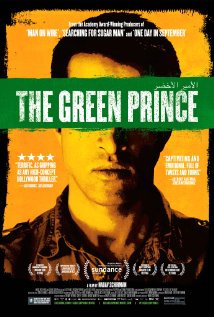
THE GREEN PRINCE
Israel, 2013, 101 minutes, Colour.
Mossab Hassan Youssef, Gonen Ben Yitszhak.
Directed by Nadav Schirman.
Sounds like the title of a fairy tale. But, this is no fairytale.
Rather, The Green Prince, is the code name for Mossab Hassan Youseff. He appears throughout the film, mostly in a straight-to-camera response to an interviewer. Mossab is the son of one of the founders of Hamas – his father is seen speaking to the crowds in some television footage. Mossab is a son of Hamas and supported the movement until he was taken by Shin Bet, questioned, tortured and persuaded to become an agent for Israel.
It is interesting to note that this theme was used very effectively in a recent Israeli fiction film, Omar.
We have 90 minutes to attend to Mossab, his early life, the pressure on him to work for Israel and the lengths to which Shin Bet went to to ensure that he was not found out and that he seemed a passionate Palestinian. Israeli military even went into his home, terrorised his mother and then exploded devices in parts of the house.
The other person who is interviewed is Gonen Ben Yitszak, genial compared to Mossab’s serious demeanour, who explains his own Israeli background and his studies and being seconded to Shin Bet. Gonen was Mossab’s controller for over a decade, leading to apprehension of Hamas leaders.
There are many realistic television footage sequences inserted into the two interviews.
The film takes a turn when Mossab leaves Israel and goes to the United States, living in San Diego, even writing a letter to his father explaining the situation and urging him to denounce his son publicly and what he has done, so that there would be no recriminations on him or the family. The final credits indicate that his family have had no contact with Mossab.
Mossab is alone in San Diego when, unexpectedly, Homeland Security agents take an interest in him, apprehend him, wanting him to be deported, basing this on his early, teenage action with Hamas, not giving any credit to his years as an Israeli agent. This situation touches Gonen and he decides to go to the United States and make a case for Mossab, even asking Shin Bet about going – but they do not reply which he takes as a silent assent to what he is doing. Yet, it is a risk.
The last part of the film shows Mossad in the United States, living a lonely life contrasting with Gonen, married with three children, a lawyer in Tel Aviv.
The style of the film is not highly imaginative or cinematic, geared more to television documentary style. But it is the intrinsic interest in the characters, in the work of Israeli spies and what this might mean for the peace process between Israel and Palestine that keeps the attention.
1. An Israeli documentary? characters, events, Israel – Palestine? 21st-century issues?
2. The start of the film, talking heads, the long interviews, the focus on each of the characters? Their interactions?
3. The narrative, Mossab, his motivation, Mossab’s father, the film of the 70s, his speeches, attitudes towards Israel? Mossab being taken tortured, age 17? Becoming an Israeli agent for over a decade? His cover, the consequences?
4. The film’s perspective on Israel, attitude towards Hamas, the West Bank? Possibilities for peace, collaboration, saving lives? Betrayal?
5. Mossab and the interviews, his explanation of himself, his clear speaking, his place in the family, his relationship with his father, his father’s prominence in the months? The different scenes, the family, his being taken and tortured? the deal? The cover, the invasion of his home, the explosion, Palestinians believing he was faithful? His work, leading to Hamas leaders and their apprehension? The effect on him? On Israel?
6. Gonen, in himself, the interviews, the genial personality, explanation of his life, his being part of Shin Bet, the torture sequences, turning Mossab, controlling him over the years?
7. The end, Mossab having to go overseas, his identity, in San Diego, the message to his father to denounce him, and the family never acknowledging him?
8. The American authorities, Homeland Security? Confining him, their attitude towards him because of his belonging to Hamas not taking account of his change?
9. Gonen, his moral decision, asking Shin Bet and their not responding? Going to San Diego, giving the testimony? His friendship Mossab? His speculation that Shin Bet did not answer but acquiesced in his going to America?
10. The Americans dropping the charges, Mossab staying in the United States, alone, question, the regular contacts with Gonen? Gonen and his family, children, lawyer in Tel Aviv?
11. The effect of audiences watching this, Israelis, Palestinians, beyond Israel and Palestine?